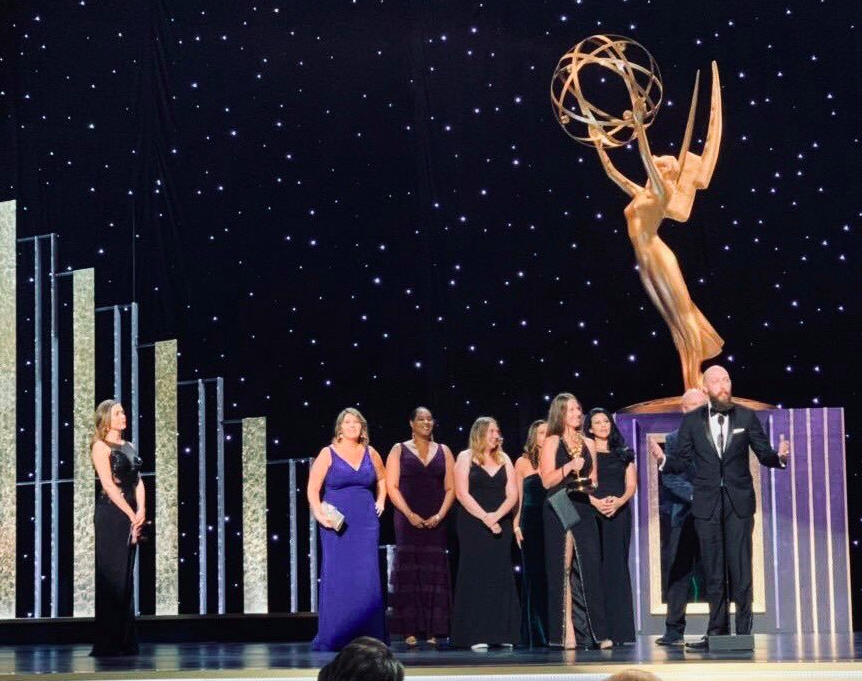Iowa State alumna wins Emmy with NASA for contributing work
Courtesy of Jim Bridenstine / NASA
Madison Tuttle, Iowa State alumna, and other contributors to NASA’s interactive broadcast receive an Emmy award for their achievements.
October 21, 2019
Madison Tuttle left Iowa State with a diploma in her hands in 2018. In 2019, rather than a diploma, Tuttle had an Emmy award in her hands.
Post-graduation, Tuttle moved to Florida to work as a public affairs specialist at NASA’s Kennedy Space Center. The Emmy was awarded for her work on the Demonstration Mission 1 (Demo-1) Broadcast.
While at Iowa State, Tuttle majored in public relations and minored in English. She was undecided for her freshman and sophomore years before declaring public relations.
Tuttle was a member of Alpha Chi Omega. She participated in music programs like concert band and the jazz program during different years at Iowa State. She held multiple internships and worked for the Iowa State Daily, all opportunities that have assisted her in finding her path to NASA.
Tuttle was a reporter, copy editor and engagement coordinator for the Iowa State Daily, which helped her realize what area of study she wanted to pursue.
“I realized that I really liked the PR side of things,” Tuttle said. “I liked more of the business aspect.”
As a senior, Tuttle was accepted into the Pathways Internship Program through USA Jobs, a program and website where all federal jobs are listed. Internship hours and other requirements must be completed before graduation.
At graduation it is determined whether interns will be promoted to a full time position. Tuttle worked in the public affairs department at the Johnson Space Center in Houston, Texas. This was Tuttle’s stepping stone to NASA.
“I would say I was definitely a kid who dreamed of being an astronaut,” Tuttle said. “Astronaut Peggy Weinstein was actually from Iowa, and she was like my childhood hero.”
Post-graduation, Tuttle continued to work with NASA. She currently works in the public affairs office at the Kennedy Space Station in Florida as the social media lead, meaning she is in charge of every Kennedy social account. Her job is to take complex, scientific information and translate it to a general audience.
“The cool thing about NASA is that NASA needs people from all backgrounds,” Tuttle said. “So I happened to find a public affairs internship that was actually at the Johnson Space Center in Texas. That’s kind of how I got my feet in the door at NASA.”
Tuttle’s coverage includes the Commercial Crew Program, which works with American aerospace industry companies to develop and operate a new generation of spacecraft and launch systems. The goal is to create systems that are capable of carrying crews to low-Earth orbit and the International Space Station (NASA, 2019).
“Essentially, we are partnered with commercial companies to develop and fly space crafts with our astronauts on board,” Tuttle said.
Boeing and SpaceX were the companies that worked with NASA through the Commercial Crew Program to create Demo-1. The test mission is completed without a crew and is required — among other tests — by NASA to become human-rated.
In March of 2019, Demo-1 launched, making it the first spacecraft to leave American soil since 2011. NASA provided coverage of the prelaunch and launch for the SpaceX Demo Mission 1 flight test.
Johnson Space Center, SpaceX and NASA headquarters worked together to provide the interactive coverage of the launch. It featured online elements as well as live video of the launch.
“Essentially, that interactive broadcast is what we put forth to the Emmys,” Tuttle said.
The broadcast stood out in the Outstanding Interactive Program category, going against five late night talk shows.
Late night shows “Conan,” “Last Week Tonight with John Oliver,” “The Daily Show with Trevor Noah,” “The Late Late Show with James Corden” and “The Late Show with Stephen Colbert” were other nominees, making the NASA and SpaceX Demo the only one of its kind in the category.
“It was such an honor to even be nominated,” Tuttle said. “I think we were all just so happy and grateful for the opportunity to go up on that stage and accept the award.”
On Sept. 14, the NASA and SpaceX Interactive Demo took home the award, making it the first of two Emmy Awards the organization has. NASA won a second Emmy that same weekend for work done by the Jet Propulsion Laboratory and their coverage on NASA’s InSight mission to Mars.
“We very much believe what we’re doing here is important,” Tuttle said. “We’re very glad that the country, and the world, is paying attention to our efforts.”
Tuttle’s work with NASA aims to tell the return to the human spaceflight story. She said her time at Iowa State prepared her for her vigorous and successful work.
“My number one word of advice is not to be afraid to say yes,” Tuttle said. “If I saw an opportunity that interested me, I said yes. Because, you know, the worst thing that could happen is that I’m doing something that’s not enjoyable for a couple hours. I took every opportunity when something came at me. I was going to get some sort of learning experience out of it.”
Taking chances on internships, clubs and opportunities on campus helped Tuttle discover what she enjoyed and what she didn’t, inspiring her to collect the skills to excel after graduation from Iowa State.
Reporting contributed by Sierra Hoeger







